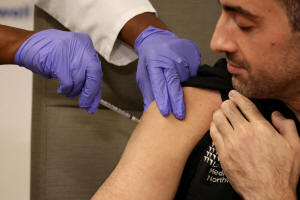Half of Americans interested in getting updated COVID shot -Reuters/Ipsos
poll
 Send a link to a friend
Send a link to a friend
 [September 15, 2023]
By Ahmed Aboulenein and Jason Lange [September 15, 2023]
By Ahmed Aboulenein and Jason Lange
WASHINGTON (Reuters) - About half of Americans are interested in getting
an updated COVID-19 vaccine more than three years after the virus
infected millions and upended daily life across the United States and
around the world, according to a new Reuters/Ipsos poll.
The results suggest that more might be willing to get a booster shot
than a year ago when only around roughly one in six Americans opted for
an updated shot, according to data from the U.S. Centers for Disease
Control and Prevention.
The nationwide online poll, which concluded on Thursday, showed that
almost 30% of respondents were very interested in getting the vaccine
and another 24% were somewhat interested. Almost 17% were not very
interested and 30% were not interested at all.
U.S. public health officials earlier this week recommended updated
COVID-19 vaccines from Pfizer/BioNTech and Moderna that target a
recently circulating Omicron variant of the coronavirus.
U.S. officials are advising a much broader use of the vaccine - by
everyone age 6 months and up - compared with the recommendations of many
European countries, which prioritize the elderly and other vulnerable
groups.
The World Health Organization's latest advice says additional doses
beyond the first two doses and one booster are not routinely recommended
other than in older adults and certain at-risk groups such as those who
have other illnesses.
Around 14% of those not interested in getting the booster said it was
because they had COVID already while another 14% said they believed
their previous vaccinations provided sufficient protection. Around 3%
said their age group does not need the vaccine.

The number of Americans hospitalized with COVID-19 has risen in recent
weeks, but remains far below the levels seen in the dark days of the
pandemic between 2020 and early 2022.
OVERALL CONCERN DOWN
Some 54% of respondents in the Reuters/Ipsos poll said they were
"personally" concerned about the spread of the virus, down from 77% in a
poll taken three years ago. At the height of the pandemic, in early
2020, some 90% of poll respondents were concerned.
Almost 42% said they were mainly interested in getting the vaccine to
reduce their risk of severe illness.

[to top of second column]
|

Adam Berman, MD Associate Chair emergency medicine Long Island
Jewish Medical Center, who was one of the first Americans to receive
the initial COVID vaccine, is inoculated with the updated
coronavirus disease (COVID-19) vaccine by Dr. Michelle Chester from
Northwell Health at Long Island Jewish Medical Center in New Hyde
Park, New York, U.S., September 13, 2023. REUTERS/Brendan McDermid
 Demand for the vaccine had dropped
sharply after 2021 when it first became available and more than 240
million people in the U.S., or 73% of the population, received at
least one shot. During the last revaccination campaign, when most
Americas had either already had the COVID virus or been previously
vaccinated, only around 56.5 million people got the updated booster
shots, CDC data shows. That's far below the annual U.S. flu vaccine
market of around 160 million shots.
COVID-19 vaccinations have also roiled U.S. politics, with many
Republicans seeing the push for vaccination as government overreach.
Only 34% of Republicans said they would be interested in getting the
updated vaccine, compared with 77% of Democrats. Florida Governor
Ron DeSantis, who is seeking the Republican nomination for the 2024
presidential contest, on Wednesday urged people in his state under
age 65 not to get the vaccination.
Some 36% of people not interested in the vaccine said their main
reason was because they think the vaccine is dangerous, and another
5% said they did not believe COVID makes people sick.
"It really concerns me that over 30% think it is dangerous when
there's really no credible evidence of that, yet a lot of
disinformation and, honestly, fear mongering," said Dr. Jesse
Goodman, an infectious disease expert at Georgetown University in
Washington and a former chief scientist at the U.S. Food and Drug
Administration.
"This does illustrate the power of misinformation and disinformation
combined with anxiety," he said.
The Reuters/Ipsos poll was conducted online and nationwide between
Sept. 8 and Sept. 14, gathering responses from 4,413 U.S. adults. It
had a credibility interval, a measure of precision, of about 2
percentage points
(Reporting by Ahmed Aboulenein and Jason Lange in Washington;
Additional reporting by Michael Erman in New York and Jennifer Rigby
in London; Editing by Scott Malone and Leslie Adler)
[© 2023 Thomson Reuters. All rights
reserved.]This material may not be published,
broadcast, rewritten or redistributed.
Thompson Reuters is solely responsible for this content. |